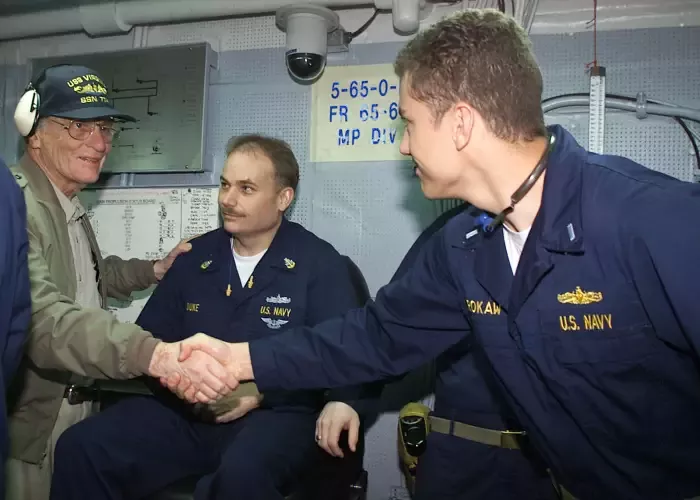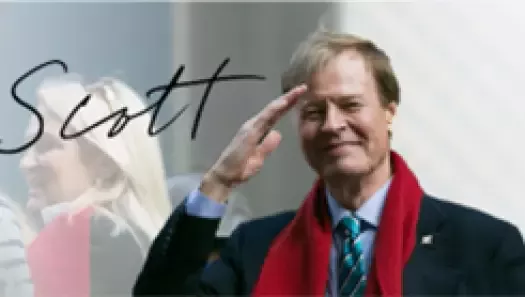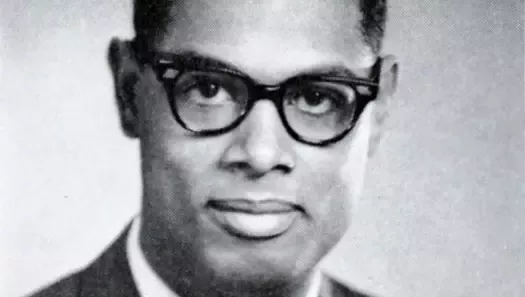WeSalute Awards
HeroVet: Senator John Warner

John William Warner, the Senior Senator from Virginia begins his twenty-sixth year in the United States Senate this month. His service to the country is long and distinguished, marked by a singular dedication to preserving the strength of our armed forces and a devotion to the men and women and their families who comprise our military forces.
Senator Warner was born on February 18, 1927, the son of the late Martha Budd Warner and Dr. John W. Warner, a physician and surgeon.
He is one of few veterans who have served in two branches--first as a 17 year-old Navy man in World War II and later as a Marine in Korea. He attributes much of his extraordinary success in the public sector to his experience in uniform and with the armed forces.
"Had it not been for what the U.S. military has done for me in these 58 years that I have been privileged to be associated with it, I would not be here in the United States Senate. And that is why I labor with others, primarily those on the Armed Services Committee, to do what we can do for today’s veterans and, most importantly, for those who are still in uniform and those who will follow in uniform in the generations to come, together with their families," he said in special comments delivered on the Senate floor on Veterans Day 2003.
First elected in 1978, Warner is one of the chamber’s most senior and respected senators. As the powerful Chairman of the Armed Services Committee, a committee on which he has served throughout his Senate career, his work reflects his commitment to the nation’s military and to securing a higher quality of life for all who serve and their families.
In announcing the $401.3 billion in budget authority for defense programs for the 2004 fiscal year, Warner declared that… "This bill comes at a critical time when hundreds of thousands of soldiers, sailors, airmen and Marines, active and reserve component, and countless civilians continue to serve valiantly around the world - from the Persian Gulf region to Afghanistan, Europe, Africa, and Korea - to secure peace and freedom. All Americans are proud of what they have accomplished.
This bill sends a strong signal of support to our men and women in uniform, and their families, and demonstrates that we value and honor their service," said Warner. "This bill ensures that they will receive a higher level of pay, benefits and healthcare, as they deserve. Further, we are providing funds so that they will be given the finest equipment to carry out their missions on behalf of freedom," Senator Warner added.
Warner has also worked to ensure that our veterans are properly recognized and acknowledged for their service. He regards the expansion of benefits for disabled military retirees to include "concurrent receipt" of both military retirement pay and veteran disability payments, thereby improving compensation for combat-related disabilities, as one of the key accomplishments of his legislation.
"I am very pleased that we have been able to expand on that ’beach head’ by extending the special compensation for combat-related disabilities to all military retirees whose disabling condition was due to combat or combat related operations, and by phasing in full concurrent receipt over ten years for those retirees whose disability is rated at 50 percent or greater," Senator Warner said.
Standing Tall During Our Nation’s "Finest Hour"
Warner’s commitment and support for the military goes well beyond enacting vital legislation. In a revealing personal experience described to his Senate peers on the second anniversary of 9/11, he reflected on those first hours of terror.
After the plane had crashed into Pentagon, he called Secretary of Defense Donald Rumsfeld and asked to join him at the crash site, "to do what little I might be able to do to bring about a reassurance, not only to those on site at the Pentagon, but around the world." Once there, he joined the Secretary and then Chairman of the Joint Chiefs, Hugh Shelton, in the command-and-control center deep in the basement of the Pentagon.
Later, he joined Rumsfeld and Shelton at a crowded press conference, providing strength and leadership during a time of maximum uncertainty:
"This is indeed the most tragic hour in America’s history, and yet I think it can be its finest hour, as our President and those with him, most notably our Secretary of Defense, our Chairman, and the men and women of the armed forces all over this world, stand ready not only to defend this nation and our allies against further attack, but to take such actions as are directed in the future in retaliation for this terrorist act -- a series of terrorist acts, unprecedented in world history"
He then prophetically predicted many fronts for the war on terror:
"We call upon the entire world to step up and help, because terrorism is a common enemy to all, and we’re in this together. The United States has borne the brunt, but who can be next? Step forward, and let us hold accountable and punish those that have perpetrated this attack," he said.
A Career Public Servant; The Best of The GI Bill
Warner’s first opportunity for public service began during World War II when in January 1945, at age 17, he enlisted in the U.S. Navy. He served on active duty until the summer of 1946 and was honorably discharged as Petty Officer 3rd Class, electronic technician’s mate.
He then attended Washington and Lee University, from which his father graduated in 1903. He was awarded a B.S. degree in basic engineering sciences in 1949. Following his graduation, Warner entered the University of Virginia Law School.
At the outbreak of the Korean War, Warner interrupted his law studies and commenced a second tour of active military duty. In October 1950, he enlisted in the United States Marine Corps. A year later, as a first lieutenant, he volunteered for duty in Korea and served as a ground officer with the First Marine Air Wing. Following his active service in Korea, he remained in the Marine Corps Reserve for 10 years and was promoted to the rank of Captain.
Twice the beneficiary of the GI bill, Senator Warner finished his law degree at the University of Virginia upon his return from Korea. In 1953, he was appointed law clerk to the late Chief Judge E. Barrett Prettyman of the U.S. Circuit Court of Appeals, and three years later was appointed an assistant U.S. attorney, serving for the next four years in the trial and appellate divisions. He entered private law practice in 1960.
When the U.S. Senate confirmed his Presidential appointment to be Under Secretary of the Navy in February 1969, Senator Warner started calling the Pentagon home. During the Vietnam War, he served in the Department of Defense for over five years, completing his service as Secretary of the Navy in 1974.
Frequently regarded as one of Washington’s most eligible bachelors, Senator Warner recently wed Jeanne Vander Myde, a longtime acquaintance, whom he first met when he was Secretary of the Navy, and she was the wife of a White House official and Navy Reservist.
They share a passion for politics and a Scottish heritage. The Senator wore a traditional Scottish kilt and his military medals on his chest during the small family ceremony. When congratulated by fellow Senators and press on CNN the day before the ceremony, Warner was admittedly "bashful" in responding, "I’m a lucky man." With his pressure-filled schedule, the Senator’s "very composed and centered" new bride is considered by many to be an extraordinary asset for him in his work. And, while always an admirer and political supporter, she now has the opportunity to join him in his lifelong mission to recognize and support our armed forces and military veterans.
Image Credit: By U.S. Navy photo by Photographer's Mate 3rd Class Julianne Metzger. [Public domain], via Wikimedia Commons



